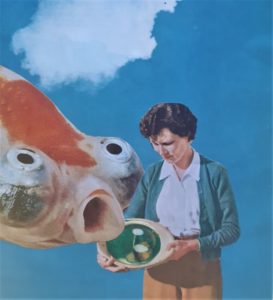I love the word “queer.” It fits my body naturally and eases my insecurities. It sits alongside my experience comfortably and gives me a way to describe the affections I have known. It’s an identity that embraces all that I am physically, emotionally, and sexually.
The word feels open and welcoming; it sees me and smirks with wholesome intent. I smirk back. It feels soft and kind and confident and all-loving; it reminds me of myself and of my community, wild and joyous.

I have the privilege of “queer” never being directed toward me as hate speech (“lesbo,” “dyke,” and “faggot,” on the other hand…). I cherish this privilege, as I know my love for the word may not be as effortless otherwise. The process of reclaiming labels thrown at us in violence can be both uncomfortable and fulfilling.
The word “queer” was once reclaimed as an act of resistance and, at its best, as a way of gathering and forming community. It came at a time when this kind of reclamation and assertiveness as a community was essential for LGBTQ+ people’s existence during the late ’80s and through the ’90s.
The term quickly became commonplace, now loved by individuals as a self-description, within academia (queer theory!) and beyond.
I have, in the past and currently, identified with several labels that fall under the LGBTQ+ acronym and other queer terms. “Lesbian” and “dyke” hold a fond place in my heart.
When “dyke” has been used against me as an act of violence, it filled me with anger. I am defensive of this term I love and the community behind it, offended that someone may try to use it with aggression. It’s the beautiful and fierce history behind the word “dyke” that I defend.
I used to feel that the label I chose to identify with was singular and exclusive. That change could not occur without great event and a need to “come out” with my new identity. Now my approach is more fluid—I call myself by the terms I like. It’s no great event; it’s simply a phonetic description of my ever-growing existence.
